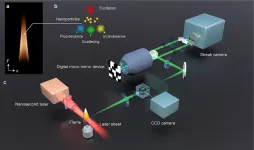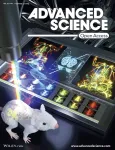The study, based on an analysis of health records from over 2.2 million patients, is the first to assess how reproductive technologies may affect the risk of cardiovascular complications during pregnancy on a national scale. Preeclampsia is a pregnancy-related complication involving new onset high blood pressure and possible organ damage that poses a serious risk to the pregnant person and the baby.
Assisted reproductive technologies encompass all interventions that involve in vitro handling of extracted eggs, sperm or embryos for the purpose of pregnancy, including in vitro fertilization (IVF), intrauterine insemination and other techniques. Technology assisted pregnancies, achieved through assisted reproductive technologies, can either be traditional (in which the person carrying the pregnancy has a genetic connection to the embryo) or gestational surrogacy (no genetic connection to embryo). The proportion of pregnancies involving assisted reproductive technologies has doubled in the U.S. over the past two decades.
“The results were surprising—few studies have previously looked into the cardiovascular complications of technology-assisted pregnancies in such detail, and none of them have assessed these complications at a national level,” said Ahmad Mustafa, MD, chief resident and upcoming cardiology fellow at Staten Island University Hospital and the study’s lead author. “Dedicated cardiovascular care needs to be incorporated into the routine follow-up of patients conceiving through assisted reproductive technologies.”
Using data from the National Inpatient Sample Database, researchers assessed the rates of cardiovascular complications for 5,874 technology-assisted pregnancies and more than 2.2 million traditional pregnancies from 2016-2018. They first examined rates of various cardiovascular problems, including abnormal heart rhythms, heart attack, heart failure, pulmonary edema, blood vessel-related complications, preeclampsia and gestational diabetes between the two groups. Then, the researchers used statistical methods to match technology-assisted pregnancies with a subset of the traditional pregnancies carried by people with a similar profile in terms of age, race and baseline health conditions (i.e., diabetes, hypertension, kidney disease and autoimmune disease).
Comparing the two matched groups and accounting for baseline risk factors, researchers found people with technology-assisted pregnancies were twice as likely to develop preeclampsia as people with traditional pregnancies. Preeclampsia causes a variety of symptoms and complications and can lead to eclampsia, a life-threatening condition characterized by seizures and/or coma in the pregnant person, for which the curative treatment is delivering the baby. Having preeclampsia also has long-term consequences, including a high risk of preeclampsia in future pregnancies along with an elevated risk of kidney disease and cardiovascular problems, such as coronary artery disease, stroke and heart failure later in life.
Although the study did not examine the mechanisms behind the association, researchers said that the placenta may develop differently in some pregnancies involving assisted reproductive technologies than in traditional pregnancies, increasing the likelihood of preeclampsia.
“Having twice the risk of preeclampsia compared to traditional pregnancy should not discourage people from considering assisted reproductive technologies. However, it is important to follow up with a cardio-obstetrician or maternal fetal medicine specialist for appropriate care and timely management if cardiovascular issues arise,” Mustafa said.
The initial analysis also found higher rates of supraventricular tachycardia (faster than normal heart rate), pulmonary edema (an abnormal buildup of fluid in the lungs) and gestational diabetes among technology-assisted pregnancies. Researchers said these differences were not statistically significant with the analysis using matched groups, suggesting the pre-match associations were likely due to confounding factors. Additionally, people with technology-assisted pregnancies had a longer length of hospital stay by 33%.
In the vast majority of the 5,874 pregnancies in the assisted reproductive technology group, the pregnant person was genetically related to the embryo, with only 190 involving gestational surrogates. Researchers also said the gestational surrogates were on average younger and healthier than people using IVF or other reproductive technologies to achieve pregnancy with a genetically related embryo, which could partially explain why the analysis found a relatively lower risk of preeclampsia among gestational surrogates.
The researchers plan to further analyze the data to determine whether certain types of reproductive technologies may confer a higher or lower risk of preeclampsia than other technologies. They also recommended closer monitoring for pregnancies using assisted reproductive technologies to enable early detection and appropriate management of complications.
Visit CardioSmart.org for more information on preeclampsia.
Mustafa will present the study, “Cardiovascular Complications of Traditional vs. Surrogate Pregnancy,” on Sunday, March 5, 2023, at 10:30 a.m. CT / 16:30 UTC in Poster Hall, Hall F.
ACC.23/WCC will take place March 4-6, 2023, in New Orleans, bringing together cardiologists and cardiovascular specialists from around the world to share the newest discoveries in treatment and prevention. Follow @ACCinTouch, @ACCMediaCenter and #ACC23/#WCCardio for the latest news from the meeting.
The American College of Cardiology (ACC) is the global leader in transforming cardiovascular care and improving heart health for all. As the preeminent source of professional medical education for the entire cardiovascular care team since 1949, ACC credentials cardiovascular professionals in over 140 countries who meet stringent qualifications and leads in the formation of health policy, standards and guidelines. Through its world-renowned family of JACC Journals, NCDR registries, ACC Accreditation Services, global network of Member Sections, CardioSmart patient resources and more, the College is committed to ensuring a world where science, knowledge and innovation optimize patient care and outcomes. Learn more at ACC.org.
###
END





